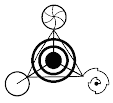The purpose of this missive is to teach that Yeshua (the contraction of Yehowshuwa (Joshua) who the Romans called Iesous - which is translated into English as "Jesus") during his crucifixion in the Greek Scripture - New Testament fable cried out the deity "Alaha" the true God of the Hebrew in Syriac (Aramaic) which is etymologically the same and the root of "Elahh" in Hebrew and "Allah" in Arabic.
We analyze these two verses from the Greek Scriptures (New Testament)...
Mar 15:34 "And at the ninth hour Jesus cried with a loud voice, saying, Eloi, Eloi, lama sabachthani? which is, being interpreted, My God, my God, why hast thou forsaken me?"
Mat 27:46 "And about the ninth hour Jesus cried with a loud voice, saying, Eli, Eli, lama sabachthani? that is to say, My God, my God, why hast thou forsaken me?"
We 1st have to realize is that
Mat 27:46 "And about the ninth hour Jesus cried with a loud voice, saying, Eli, Eli, lama sabachthani? that is to say, My God, my God, why hast thou forsaken me?"
We 1st have to realize is that
1. There are NO original versions of the four Gospels and that as these verses prove Yeshua spoke Aramaic NOT Greek.
2. The original works were most likely copied and destroyed by the Niciene council who were historically notorious for destroying works that went against their brand of Greeco/Roman Christendom.
In addition, we have concise proof that Jesus spoke Aramaic (Syriac) by his use of the Semitic greeting:"Peace [Be] Unto You"
Which reads in Aramaic as "Shalama Alakhom" and is transliterated in the extended Afro-Asiatic Semitic languages as:
1.Shalom aleichem (Hebrew)
2. As-Salamu Alaykum (Arabic)
Luk 24:36 "And as they thus spake, Jesus himself stood in the midst of them, and saith unto them, Peace [be] unto you."
Jhn 20:19 "Then the same day at evening, being the first [day] of the week, when the doors were shut where the disciples were assembled for fear of the Jews, came Jesus and stood in the midst, and saith unto them, Peace [be] unto you."
Jhn 20:21 "Then said Jesus to them again, Peace [be] unto you: as [my] Father hath sent me, even so send I you."
Jhn 20:26 "And after eight days again his disciples were within, and Thomas with them: [then] came Jesus, the doors being shut, and stood in the midst, and said, Peace [be] unto you."
In addition, we have concise proof that Jesus spoke Aramaic (Syriac) by his use of the Semitic greeting:"Peace [Be] Unto You"
Which reads in Aramaic as "Shalama Alakhom" and is transliterated in the extended Afro-Asiatic Semitic languages as:
1.Shalom aleichem (Hebrew)
2. As-Salamu Alaykum (Arabic)
Luk 24:36 "And as they thus spake, Jesus himself stood in the midst of them, and saith unto them, Peace [be] unto you."
Jhn 20:19 "Then the same day at evening, being the first [day] of the week, when the doors were shut where the disciples were assembled for fear of the Jews, came Jesus and stood in the midst, and saith unto them, Peace [be] unto you."
Jhn 20:21 "Then said Jesus to them again, Peace [be] unto you: as [my] Father hath sent me, even so send I you."
Jhn 20:26 "And after eight days again his disciples were within, and Thomas with them: [then] came Jesus, the doors being shut, and stood in the midst, and said, Peace [be] unto you."
The definifive of ELOI (My God)
As per Strong's Concordance and the Hebraic Professor extraordinaire Wilhelm Gesenius
The commentary is transliterated into English as follows:Eloi, Syriac form (Alahi, Elohi) for Hebrew Eli (Psalms 21, Psalms 22:2): Mark 15:34
We see from this Strong's concordance definition and commentary that Eloi in Syriac form is Alahi (My Alaha) and in Hebrew form Elohi (My Eloh).
The letter YOD is the possessive. ex: Malach = King, Malachi = My King. The definifive also lists as a root - Elahh (H426)
The letter YOD is the possessive. ex: Malach = King, Malachi = My King. The definifive also lists as a root - Elahh (H426)
The etymological root of Eloi is Elahh and the corresponding root of Elahh is Elowahh (H433)
And as we can read here in the lexicon commentary composed by Gesenius: Elowahh is the true God and is the same as saying Allah and Alaha.
The commentary is transliterated as follows:
"ELOAH (with prefix and suffix L'ELoH Dan 11:38; L'ELoHW Hab. 1:11 m.God (Arab. ALLAH, ALAH, with art. ALLAH of the true God; Syr. [Aramaic] Alahu;Chald.ELOH)."
"ELOAH (with prefix and suffix L'ELoH Dan 11:38; L'ELoHW Hab. 1:11 m.God (Arab. ALLAH, ALAH, with art. ALLAH of the true God; Syr. [Aramaic] Alahu;Chald.ELOH)."
Using Semitic language flash cards we see that "Alah" in Arabic and "Eloh" in Hebrew are the same word (God) that uses similar fonts.
We see here from these diagrams that Aramaic, Hebrew and Arabic are from the same family of languages.



















2 comments:
i thought jesus spoke arabic and not aramaic...since he was a nazarite...
Ohly sub Arabian dialects such as Ge'ez existed during the days of the Messiah. Aramaic is a precursor to the language of Arabic.
Post a Comment